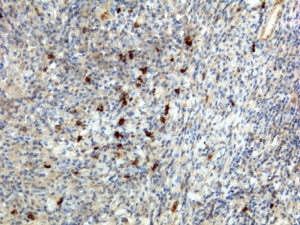anti-IgA (human) Rabbit Monoclonal (RM128) (Biotin)
| Code | Size | Price |
|---|
| REV-31-1030-02-C050 | 50 ug | £455.00 |
Quantity:
Prices exclude any Taxes / VAT
Overview
Antibody Isotype: Rabbit IgG
Antibody Clonality: Recombinant Antibody
Antibody Clone: RM128
Regulatory Status: RUO
Target Species: Human
Applications:
- Enzyme-Linked Immunosorbent Assay (ELISA)
- Fluorescence-activated cell sorting (FACS)
- Immunocytochemistry (ICC)
- Immunohistochemistry (IHC)
Shipping:
Blue Ice
Storage:
+4°C
Images
Documents
Further Information
Alternate Names/Synonyms:
Immunoglobulin A
Concentration:
1 mg/ml
EClass:
32160000
Form (Short):
liquid
Formulation:
Liquid. 50% Glycerol/PBS with 1% BSA and 0.09% sodium azide.
Handling Advice:
Avoid freeze/thaw cycles.
Immunogen:
Human IgA.
Labels - Conjugates:
Biotin
Long Description:
Recombinant Antibody. This antibody reacts to human IgA, including both IgA1 and IgA2. No cross reactivity with human IgG, IgM, IgD, or IgE. Applications: ICC, IHC, FACS, ELISA. Source: Rabbit. Liquid. 50% Glycerol/PBS with 1% BSA and 0.09% sodium azide. Immunoglobulin A (IgA) is an antibody isotype that plays a crucial role in the immune function of mucous membranes. IgA has two subclasses (IgA1 and IgA2) and can be produced as a monomeric as well as a dimeric form. The IgA dimeric form is the most prevalent and is also called secretory IgA (sIgA). sIgA is the main immunoglobulin found in mucous secretions, including tears, saliva, sweat, colostrum and secretions from the genitourinary tract, gastrointestinal tract, prostate and respiratory epithelium. It is also found in small amounts in blood. The secretory component of sIgA protects the immunoglobulin from being degraded by proteolytic enzymes; thus, sIgA can survive in the harsh gastrointestinal tract environment and provide protection against microbes that multiply in body secretions. In the blood, IgA interacts with the Fc receptor called FcαRI (or CD89), which is expressed on immune effector cells, to initiate inflammatory reactions. This anti-human secondary antibody has well-characterized specificity for human IgA immunoglobulins and is useful in the detection, sorting or purification of its specified target. In general, secondary antibodies offer increased versatility enabling users to use many detection systems (e.g. HRP, AP, fluorescence). They can also provide greater sensitivity through signal amplification as multiple secondary antibodies can bind to a single primary antibody.
NCBI, Uniprot Number:
P01876/P01877
Package Type:
Vial
Product Description:
Immunoglobulin A (IgA) is an antibody isotype that plays a crucial role in the immune function of mucous membranes. IgA has two subclasses (IgA1 and IgA2) and can be produced as a monomeric as well as a dimeric form. The IgA dimeric form is the most prevalent and is also called secretory IgA (sIgA). sIgA is the main immunoglobulin found in mucous secretions, including tears, saliva, sweat, colostrum and secretions from the genitourinary tract, gastrointestinal tract, prostate and respiratory epithelium. It is also found in small amounts in blood. The secretory component of sIgA protects the immunoglobulin from being degraded by proteolytic enzymes; thus, sIgA can survive in the harsh gastrointestinal tract environment and provide protection against microbes that multiply in body secretions. In the blood, IgA interacts with the Fc receptor called FcalphaRI (or CD89), which is expressed on immune effector cells, to initiate inflammatory reactions. This anti-human secondary antibody has well-characterized specificity for human IgA immunoglobulins and is useful in the detection, sorting or purification of its specified target. In general, secondary antibodies offer increased versatility enabling users to use many detection systems (e.g. HRP, AP, fluorescence). They can also provide greater sensitivity through signal amplification as multiple secondary antibodies can bind to a single primary antibody.
Purity:
Protein A purified.
Source / Host:
Rabbit
Specificity:
This antibody reacts to human IgA, including both IgA1 and IgA2. No cross reactivity with human IgG, IgM, IgD, or IgE.
Transportation:
Non-hazardous
UNSPSC Category:
Secondary Antibody Conjugates
UNSPSC Number:
12352203
Use & Stability:
Stable for at least 1 year after receipt when stored at -20°C.



